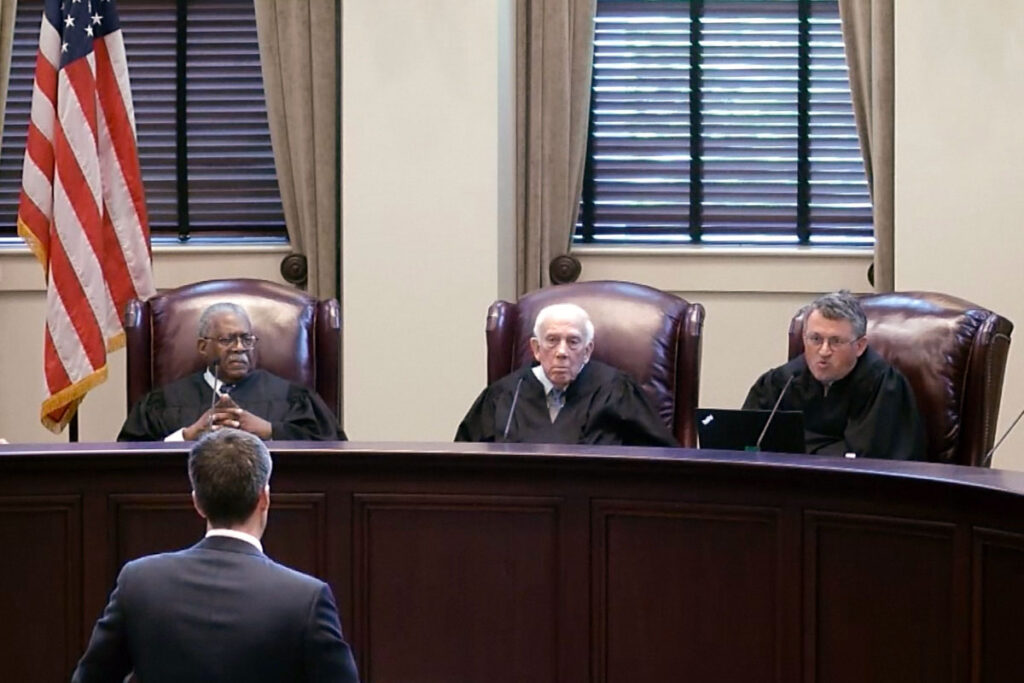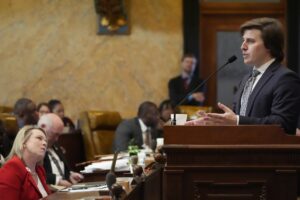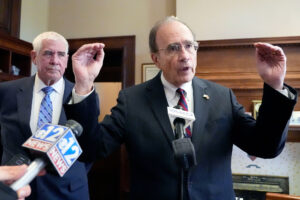Allowing House Bill 1020 to stand “would constitute a tremendous transfer of power from the voters of Mississippi, who have for over 100 years elected our circuit judges, to the Legislature,” attorney Cliff Johnson told eight members of the Mississippi Supreme Court during hearings Thursday.
The hearing did not include Chief Justice Michael K. Randolph, who recused himself from the case. H.B. 1020 gives him the power to appoint unelected judges to serve in majority-Black Hinds County, where the capital City of Jackson is located. Under the law, the chief justice would appoint four new judges to serve in the Hinds County Circuit Court until 2026 and one permanent municipal judge to serve in the Capitol Complex Improvement District.
Legislative leaders said during debate over H.B. 1020 that their goal was to make Jackson safer and fight crime. Opponents of the law have long argued that the appointments will take power away from locally elected circuit court judges and diminish Black voters’ power in Hinds County. During the July 6 hearing, though, Johnson argued that the circuit court appointments are not allowed under Article VI, Section 153 of the Mississippi Constitution, which says “judges of the circuit and chancery courts shall be elected by the people.”
“The Constitution provides no category of special judges or temporary special judges even,” said the MacArthur Justice Center director, who made arguments on behalf of three Jackson residents who are plaintiffs in the case. He called H.B. 1020 “radical legislation that unconstitutionally packs the Hinds County court.”
Mississippi Solicitor General Scott Stewart defended the law during the hearing, pointing out that “the Legislature has long provided for these appointments.” That includes three currently serving judges in Hinds County that the chief justice appointed under a previous law; the plaintiffs are also challenging those appointments.
“This has been responsibly used, calibrated, often with appointments of several months, but always in situations of important public need,” the solicitor general told the eight justices.
The “consequences” of overturning H.B. 1020 and ruling that such appointments to circuit courts are not allowed under the Mississippi Constitution “would be quite staggering” because of the long history of chief justices appointing temporary judges, he added.
“All of these appointments in who knows how many hundreds of cases—the court would be announcing that all of those were constitutionally invalid, and clearly invalid beyond a reasonable doubt,” Stewart said. “I think those features alone make it impossible for this court to invalidate it.”
‘Just Pick The One You Like Best’
Solicitor General Scott Stewart said the Hinds County circuit court appointments are allowed under the Mississippi Constitution because they are “special judges,” not circuit court judges.
Justice James W. Kitchens expressed skepticism over that claim.
“You want us to say ‘special judges,’ but the statute says something else,” the justice said, noting that H.B. 1020 refers to them as “temporary special circuit judges.” Should the court “just pick the one you like best?” he asked Stewart.
“I think it could be a special judge, I think it could be a special circuit judge, I think it could be a temporary judge,” Stewart said. He argued that the focus should be on substance, not “semantics.” He said the special circuit judges are different from elected judges because, while elected judges are guaranteed a four-year term, the appointments could be rescinded early. Both Kitchens and Justice Leslie D. King questioned that logic, pointing out that the law does not include a mechanism for removing judges before the appointments expire in 2026.
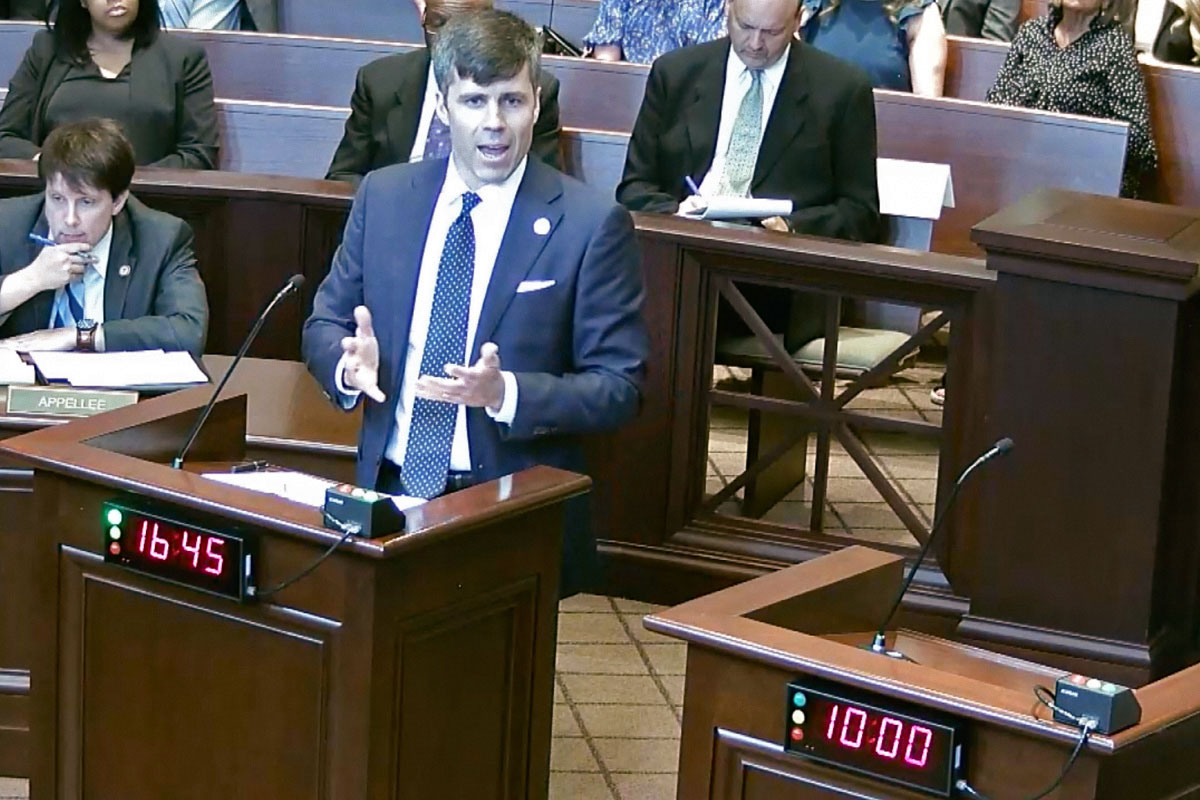
During the arguments, the plaintiff’s attorney argued that it matters whether the judges are circuit judges or some other category of judge and that semantics and substance are intertwined in this case. “In order to uphold (H.B. 1020), … you would have to find that these judges aren’t really circuit judges” and that the CCID court “is a municipal court,” Cliff Johnson said.
Kitchens also questioned the capitol district court and whether it is, in fact, a municipal court that allows parties to appeal to the circuit court. Stewart said it is a legitimate municipal court under the law and that people will be able to appeal a case from the CCID court to the circuit court, but the justice pointed out that H.B. 1020 does not say that.
“You may want it to be in there, but I don’t see it. There is no appeal mechanism in this statute. This creates a previously unheard-of court,” Kitchens said. The skeptical justice noted that H.B. 1020 says “any person convicted in the CCID inferior court may be placed in the custody of the Mississippi Department of Corrections, Central Mississippi facility.”
“There is not a municipal court that can put people in state prison in the State of Mississippi,” Kitchens said. “… Have you ever heard of a municipal court in the State of Mississippi sending somebody to a state prison for a misdemeanor?”
“No, (not) until this one,” Stewart replied.
Associate Justice David Ishee, who previously served as a municipal judge before joining the Mississippi Supreme Court, said misdemeanor statutes require sentences to be served in city or county jails—not state prisons. He pondered whether preexisting law allows a municipal court to sentence people to serve time in state prison.
“This is not a municipal court,” Kitchens declared.
‘Backlogs In Courts Aren’t Always About Judges’
Other justices appeared to express more sympathy for the state’s arguments, though, with Justice Dawn Beam asking Stewart to clarify that the law is “simply trying to address a backlog issue or a justice issue in order for justice to be served.” The solicitor general agreed with her characterization.
Attorney Cliff Johnson said that he recognized “the problems that arise when cases don’t move” and “the human costs when people sit in jails” waiting for courts to act, but suggested that appointing judges alone will not solve the problem. “Recognizing the backlogs in courts aren’t always about judges, the Legislature could finally fully fund the crime lab,” he suggested. “… We can’t establish subordinate judges who provide the type of assistance that I believe the Legislature seeks.”
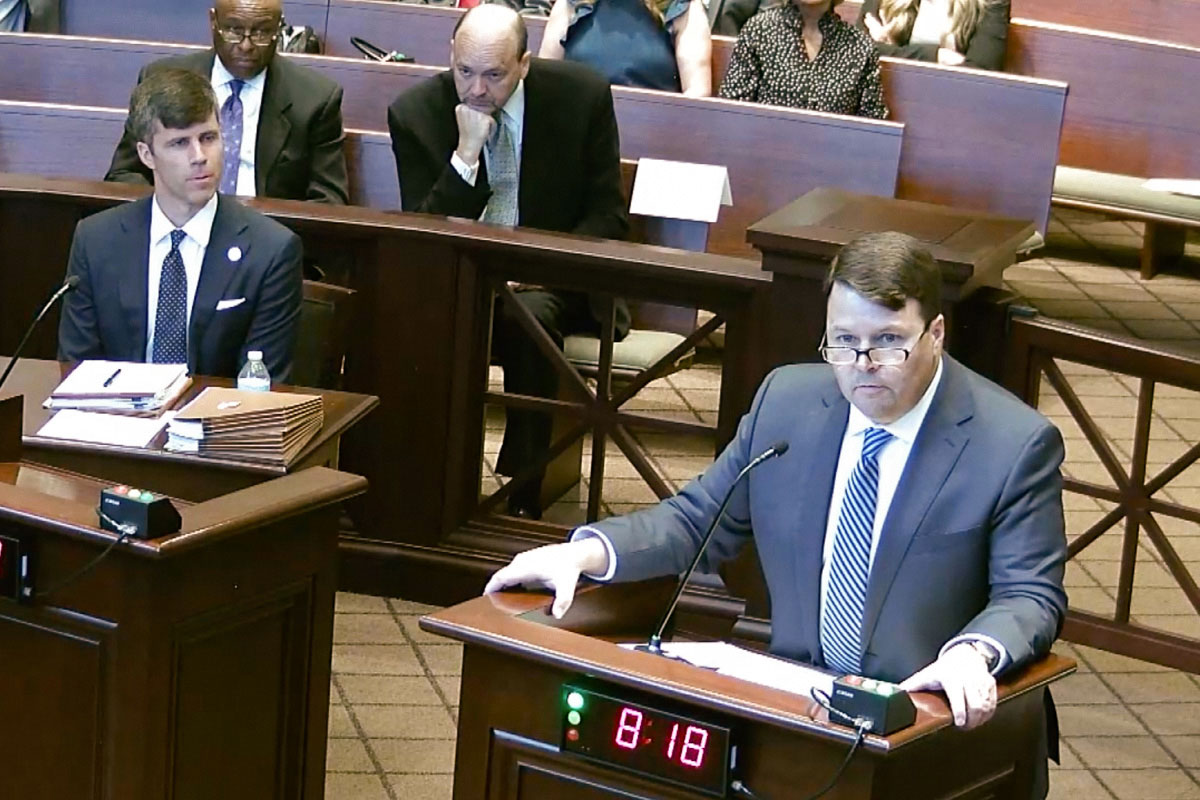
While the Mississippi Supreme Court’s justices deliberate over H.B. 1020, a separate case over the law is also proceeding in federal court. In that case, led by the NAACP, plaintiffs are asking U.S. District Court for the Southern District of Mississippi Judge Henry T. Wingate to permanently bar Chief Justice Randolph from making the appointments in Hinds County and to block another law, Senate Bill 2343, which expands the jurisdiction of Capitol Police beyond the CCID to include the entire City of Jackson.
The two laws, the NAACP said in a statement in April, amount to “a state takeover of Jackson.” Wingate has temporarily blocked both from taking effect while he considers the case.
You can watch the July 6 Mississippi Supreme Court hearing over H.B. 1020 at this link.


